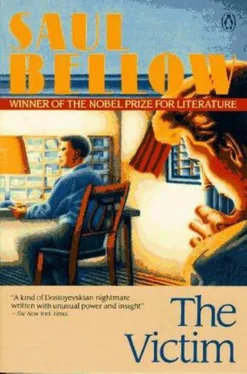Saul Bellow - The Victim
Здесь есть возможность читать онлайн «Saul Bellow - The Victim» весь текст электронной книги совершенно бесплатно (целиком полную версию без сокращений). В некоторых случаях можно слушать аудио, скачать через торрент в формате fb2 и присутствует краткое содержание. Год выпуска: 1988, Издательство: Penguin Books, Жанр: Современная проза, на английском языке. Описание произведения, (предисловие) а так же отзывы посетителей доступны на портале библиотеки ЛибКат.
- Название:The Victim
- Автор:
- Издательство:Penguin Books
- Жанр:
- Год:1988
- ISBN:нет данных
- Рейтинг книги:3 / 5. Голосов: 1
-
Избранное:Добавить в избранное
- Отзывы:
-
Ваша оценка:
- 60
- 1
- 2
- 3
- 4
- 5
The Victim: краткое содержание, описание и аннотация
Предлагаем к чтению аннотацию, описание, краткое содержание или предисловие (зависит от того, что написал сам автор книги «The Victim»). Если вы не нашли необходимую информацию о книге — напишите в комментариях, мы постараемся отыскать её.
The Victim — читать онлайн бесплатно полную книгу (весь текст) целиком
Ниже представлен текст книги, разбитый по страницам. Система сохранения места последней прочитанной страницы, позволяет с удобством читать онлайн бесплатно книгу «The Victim», без необходимости каждый раз заново искать на чём Вы остановились. Поставьте закладку, и сможете в любой момент перейти на страницу, на которой закончили чтение.
Интервал:
Закладка:
“You’ll excuse me,” said Leventhal with somewhat provocative politeness, “but I have a wire to send. I was about to go send it when you came.” Did that sound like an invention? Allbee might think so and interpret it as a maneuver to get rid of him. However, he had seen him writing when he entered, so why shouldn’t it be true? He might have been drafting the message. Anyhow, why should he care? And besides, it was absolutely a fact that he was going to wire Max. Allbee could come along and check up on him if he wanted to. He studied his face to see how he was taking it. Allbee had risen. Suddenly Leventhal twisted about and his heart sprang. He thought he had seen a mouse dart into the corner and he hurried after it, lit a match, and examined the molding. There was no hole. “Ran away!” he thought. Or was it his fancy? “We have mice here,” he explained to Allbee, who was at the door in the dark vestibule. He seemed to turn his head away, unresponding.
When they reached the lower hall, Allbee stopped and said, “You try to put all the blame on me, but you know it’s true that you’re to blame. You and you only. For everything. You ruined me. Ruined! Because that’s what I am, ruined! You’re the one that’s responsible. You did it to me deliberately, out of hate. Out of pure hate!”
He had clutched Leventhal’s shirt and he twisted it as he spoke.
“You’re crazy!” Leventhal shouted in his face. “You’re a crazy stumblebum, that’s what you are. The booze is eating your brain up. Take your hands off me. Off, I say!” He pushed Allbee with all the force of his powerful arms. He fell against the wall with an impact that sickened Leventhal. Allbee stood up, wiped his mouth, and stared at his hand.
“No blood. Too bad. Then you could say I spilled your blood, too,” Leventhal cried.
Allbee answered nothing. He dusted his clothes unskillfully, stiff-handedly, as though beating his arms. Then he went. Leventhal watched his hasty, unsteady progress down the street.
Mr Nunez, who had seen the incident, started up astride the striped canvas of his beach chair, and his wife, who lay on the bed near the window in a white slip, whispered, “ Que pasa ?” Leventhal looked at her in bewilderment.
7
“THE nerve of him, that damned clown!” said Leventhal fiercely. His high, thick chest felt intolerably bound and compressed, and he lifted his shoulders in an effort to ease his breathing. “Ruined! I’ll ruin him if he comes near me. What a gall!”
The letter to Mary was crumpled in his hand. It was impossible to send it like this. He would have to get another envelope and stamp, and for a moment this inconvenience grew overwhelmingly into the worst consequence of the scuffle. He tore the letter open, crushed the envelope, and threw it over the balustrade. Nunez had gone into the house and he was alone on the stoop. His glance seemed to cover the street; in reality he saw almost nothing but was only aware of the featureless darkness and the equally featureless shine of bulbs the length of the block.
Then his anger began to sink. He drew in his cheeks, somberly enlarging his eyes. The skin about them felt dry and tight. To think up such a thing! The senselessness of it perturbed him most of all. “Why me?” he thought, frowning. “Of course, he has to have someone to blame; that’s how it starts. But when he goes over everybody he knows, in that brain of his, how does he wind up with me?” That was what was puzzling. No doubt the Rudiger business had a bearing on it; for some reason it caught on, and worked on a deeper cause. But that alone, out of hundreds of alternatives, had snagged.
In a general way, anyone could see that there was great unfairness in one man’s having all the comforts of life while another had nothing. But between man and man, how was this to be dealt with? Any derelict panhandler or bum might buttonhole you on the street and say, “The world wasn’t made for you any more than it was for me, was it?” The error in this was to forget that neither man had made the arrangements, and so it was perfectly right to say, “Why pick on me? I didn’t set this up any more than you did.” Admittedly there was a wrong, a general wrong. Allbee, on the other hand, came along and said “ You !” and that was what was so meaningless. For you might feel that something was owing to the panhandler, but to be directly blamed was entirely different.
People met you once or twice and they hated you. What was the reason; what inspired it? This Allbee illustrated it well because he was too degenerate a drunk to hide his feelings. You had only to be yourself to provoke them. Why? A sigh of helplessness escaped Leventhal. If they still believed it would work, they would make little dolls of wax and stick pins into them. And why do they pick out this, that, or the other person to hate — Tom, Dick or Harry? No one can say. They hate your smile or the way you blow your nose or use a napkin. Anything will do for an excuse. And meanwhile this Harry, the object of it, doesn’t even suspect. How should he know someone is carrying around an image of him (just as a woman may paste a lover’s picture on the mirror of her vanity case or a man his wife’s snapshot in his wallet), carrying it around to look at and hate? It doesn’t even have to be a reproduction of poor Harry. It might as well be the king of diamonds with his embroidery, his whiskers, his sword, and all. It doesn’t make a bit of difference. Leventhal had to confess that he himself had occasionally sinned in this respect, and he was not ordinarily a malicious person. But certain people did call out this feeling. He saw Cohen, let us say, once or twice, and then, when his name was mentioned in company, let fall an uncomplimentary remark about him. Not that this Cohen had ever offended him. But what were all the codes and rules, Leventhal reflected, except an answer to our own nature. Would we have to be told “ Love!” if we loved as we breathed? No, obviously. Which was not to say that we didn’t love but had to be assisted whenever the motor started missing. The peculiar thing struck him that everything else in nature was bounded; trees, dogs, and ants didn’t grow beyond a certain size. “But we,” lie thought, “we go in all directions without any limit.”
He had put the letter in his pocket and he now took it out and debated whether to climb up to the flat for a stamp and envelope, or to try to buy them in a drugstore. He might not be able to obtain a single envelope. He did not want to buy a box of stationery.
Then he heard his name called and recognized Harkavy’s voice.
“Is that you, Dan?” he said looking down the stairs at the dim, tall figure on the sidewalk. The shifting of the theater lights across the way made his vision uncertain. It was Har-kavy. There were two women with him, one holding a child by the hand.
“Come down out of the clouds,” said Harkavy. “Are you asleep, or something, on your feet?”
Nunez returned to his deck chair. His wife was in the window, resting her head on the sash.
“Do you go into a trance when the little woman is away?”
Harkavy’s companions laughed.
“Dan, how are you?” said Leventhal, descending. “Oh, Mrs Harkavy, so that’s you?”
“Julia, Julia, too.” Harkavy pointed at his sister with his cigarette holder.
“Julia, Mrs Harkavy, glad to see you both.”
“And my granddaughter Libbie,” said Mrs Harkavy.
“Oh, this is your girl, Julia?”
“Yes.”
Leventhal tried to make out the child’s features; he saw only the vivid pallor of her face and the reddish darkness of her hair.
“Very active, Libbie,” said Harkavy. “A little too energetic, at times.”
Читать дальшеИнтервал:
Закладка:
Похожие книги на «The Victim»
Представляем Вашему вниманию похожие книги на «The Victim» списком для выбора. Мы отобрали схожую по названию и смыслу литературу в надежде предоставить читателям больше вариантов отыскать новые, интересные, ещё непрочитанные произведения.
Обсуждение, отзывы о книге «The Victim» и просто собственные мнения читателей. Оставьте ваши комментарии, напишите, что Вы думаете о произведении, его смысле или главных героях. Укажите что конкретно понравилось, а что нет, и почему Вы так считаете.











